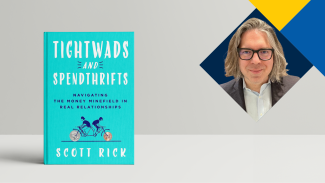Michigan Ross Professor Explores Couples Finances in New Book

In his new book, Tightwads and Spendthrifts: Navigating the Money Minefield in Real Relationships, Scott Rick, associate professor of marketing, explores the link between money, relationships, and personal financial habits. With a combination of planning and exploration exercises and readily applicable research findings, the book helps readers understand their money behaviors. Tips include new approaches to gift-giving, pros and cons of particular account setups, preventing bad financial habits in parenting, conflict reduction and management, advice for singles, and more.
In the book, Rick explains that differences of opinion on finances are a high predictor of marital conflict, stress, and divorce rates. Rick's work provides guidance on how individuals who are either tight with money ('tightwads') or particularly extravagant ('spendthrifts') can succeed and coexist in romantic relationships. Tightwads and Spendthrifts serves as a data and psychology-backed financial guide for those in relationships, helping readers understand their own and their partner’s habits. The hope is that with this understanding, couples can find a middle ground and happiness.
“The way we handle financial matters can create psychological dynamics that might not otherwise occur,” wrote Rick. “For example, newlyweds might choose a bank account structure that provides too much transparency about how each partner is spending, shaping conversations and arguments for years to come…Our psychology not only influences how we handle money, but the way we handle money also influences our psychology.”
Much of the data Rick discusses in the book is built off comprehensive psychological literature, his groundbreaking research on money and marriage, and a recent two-year-long research study. The study incentivized newlywed couples to either maintain separate accounts, unify into a joint account, or do as they wished. The couples were checked in with regularly and asked about their happiness levels and relationship satisfaction. Rick’s findings suggest that while having a joint account is beneficial, it should be complemented with separate accounts for personal expenditures. This strategy maintains the couple's happiness and prevents a decline present in other account setups. Nonetheless, his findings also recognize the role of individuality and financial autonomy within relationships, adding depth to our understanding of the interplay between personal finances and relationships.
The book also explores why a person could become a tightwad or a spendthrift. It's not always easy to identify a 'tightwad' or 'spendthrift' based solely on their financial situation. Rick finds that tightwads aren't necessarily tight with money because they lack funds. Instead, many have experienced periods of economic insecurity, prompting them to develop anxious financial habits that remain even when their circumstances improve. Factors such as adolescent socioeconomic status, parenting, financial education, and experienced economic upturns or downturns are more useful indicators of spending habits. This is particularly impactful when looking at the recent struggles of millennials and Generation Z, facing the financial struggles of inflation, COVID-19, and a downshifting job market. Rick believes that these struggles may cause a future wave of tightwads.
“I would guess that the COVID-19 era would have a small bump in the frequency of ‘tightwadism,’” said Rick. “It's not huge because many people's feelings don't match what is on paper. Some people will go through this financial crunch in their formative years and won't shake it later. On average, I would expect this to be a tightwad-creating era.”
Continuing his research in the consumer psychology of couples and financial decisions, Rick is interested in expanding his research into several areas. Possible areas of future study include the effect of external feedback on marital disagreement, the impact of neurodivergence on spending, and the effect of prenuptial agreements on a couple’s long-term happiness. He is also keen on applying the ‘tightwad’ and ‘spendthrift’ model on mismatched pairs outside of romantic couples, such as business and familial relationships. These research areas are poised to reveal previously unexplored aspects of interpersonal and financial interactions, promising worthy additions to Rick's unique and timely body of work.







